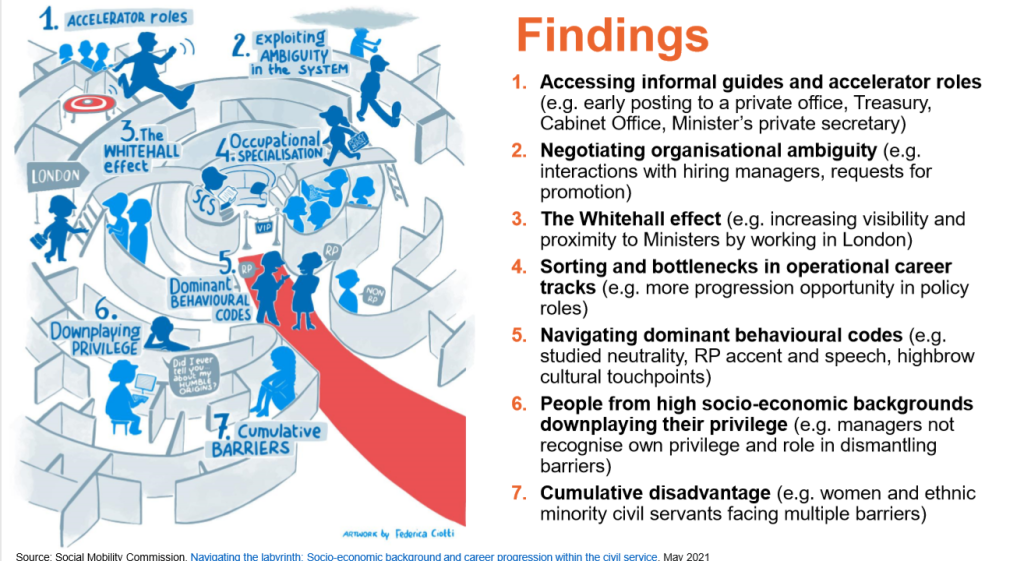What steps can you – as an employer – take to remove barriers to progression within your organisation for people from low socio-economic backgrounds (SEB)?
Following the publication of our report on progression in the civil service, Navigating the Labyrinth, our latest Employer Masterclass explored how to make sure that your processes aren’t actively getting in the way of advancement and that you’re supporting employees from low SEBs to progress.
We were delighted to be joined by Jenifer Lee, Liverpool Office Senior Partner and Jenny Baskerville, Head of Inclusion, Diversity and Social Equality at KPMG as well as Jason Ghaboos, Deputy Director, Civil Service Diversity and Inclusion; each shared their unique perspectives on how progression can be a central pillar of your inclusion strategy.
Catch up on the latest masterclass below. When you’re done, find out how well your organisation is doing to support employees from low SEBs to progress. Download our social mobility scorecard and assess your performance.
Why focus on progression?
Many organisations incorrectly see hiring a diverse workforce as the end goal of their inclusion strategies. In fact, progression is often one of the last areas employers consider.
Fair recruitment is important, but so is making sure that – once employees from low SEBs ‘get in’ – your own progression practices aren’t preventing them from ‘getting on’ within the organisation.
In our masterclass, we ran through key findings about progression in the civil service. The barriers were far-ranging – some were unique to the civil service, while others are issues that many organisations will recognise within their own structures and practices.

Some industries do struggle more than others to progress employees from low SEBs. However, data tells us that progression is a problem across all industries.
Progression: where do I start?
It can be difficult for employers to know exactly where to start when addressing barriers to progression. During the masterclass, we highlighted the key recommendations from our action plan that every employer should take into consideration.
Some of these focused more on making progression processes formal and fair, while others focused more on creating an inclusive culture that doesn’t alienate or prevent those from low SEBs from advancing. For more on the takeaways from the report, read our recent blogpost examining the action plan and our recommendations.
1. Leadership and culture
Start off by making it clear that improving socio-economic diversity at senior levels is a priority for leadership – and that the organisation is committed to removing barriers to progression.
From there, set clear expectations around both organisational culture and the behaviours expected of your employees, and clearly outline your plans and commitments to your workforce.
2. Listen to your workforce – what do your employees tell you?
Maintaining a dialogue with your workforce – both as individuals and a collective – is crucial.
Embed processes within your organisation that support employees to progress at their own pace. Employees should have a clear understanding of progression opportunities, regular performance reviews and access to relevant training opportunities. Offering access to mentoring relationships – so long as they are open to all – can be a valuable tool for keeping these conversations going
Employee Resource Groups (also known as ERGs, affinity groups, champion groups, staff/people/business network groups) provide a forum to engage your workforce and ask their views on key issues that matter to them. If you don’t have one, create one, then be sure to take its views into account as you further develop your approach.
3. Enablers – Using data
You can take several actions that will make this process easier for you, the employer.
Data – for example – is a vital enabler to help understand the barriers exist and develop a strategy that addresses them. Asking your employees about their socio-economic background and using this data to identify bottlenecks and focus your efforts around these is an important step toward an effective strategy.
Formalising progression policies and having a clear framework for the requirements of each role will help to make your process more transparent and ensure that managers are accountable for decisions on promotion and progression.
4. Wider ecosystem
What you do and say externally is as important as the internal commitments you make to your workforce. Embed those same principles and commitments in your relationships with partners, clients and suppliers to ensure that everyone involved recognises the importance of socio-economic diversity and inclusive teams.
Learning from others
The speakers at our masterclass recognised the challenges identified in the ‘Navigating the Labyrinth’ report; both acknowledged there was “no silver bullet” for these issues.
“Data” Jason said, “has been absolutely instrumental to identifying where the barriers to progression are for us as an employer”. Echoing this, Jenny noted that KPMG’s first step on its journey back in 2014 was “capturing robust data”.
Examples from the civil service showed the impact of different approaches on promoting progression. Jason shared a case-study used in the Ministry of Justice which provided sponsorship and mentoring opportunities and generated strong outcomes for those who participated.
KPMG used its data to start a conversation, conducting a campaign internally to engage with the workforce around a shared vision. A new work allocation framework helped ensure fairer access to stretch roles, while the personal development programme was expanded to improve availability to employees from low SEBs. She emphasised the value of working with partners to “move the dial forward” on socio-economic diversity. Jennifer Lee, who shared her own inspiring journey from graduate trainee to Liverpool Office Senior Partner with the audience, announced that she has recently taken on the role of Partner Sponsor in their newly created Social Mobility Network, which she hopes will encourage others to share their experience.
Catch up on the session by watching the video at the top of the page. To find out more, read the progression section of our cross-sector toolkit.
